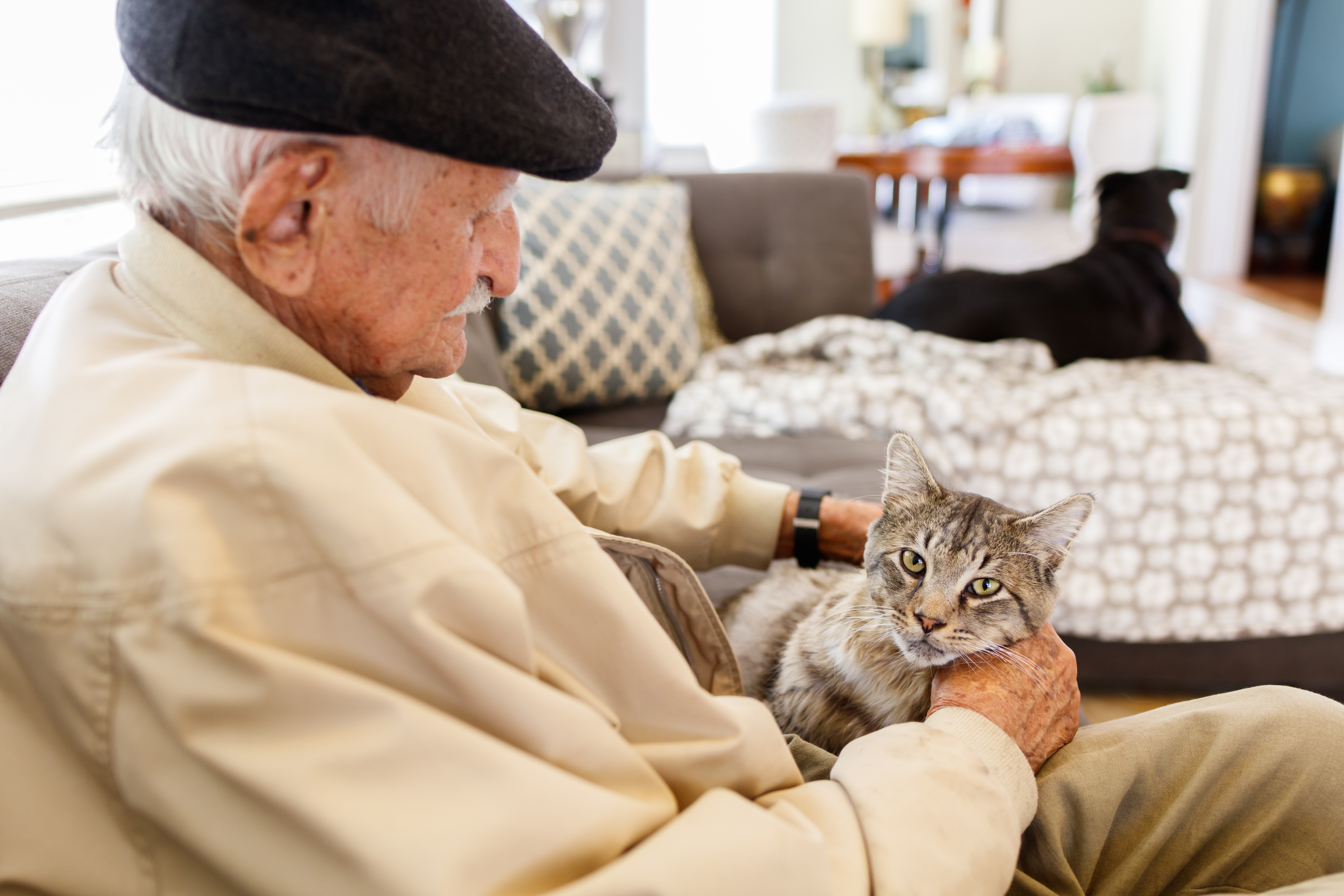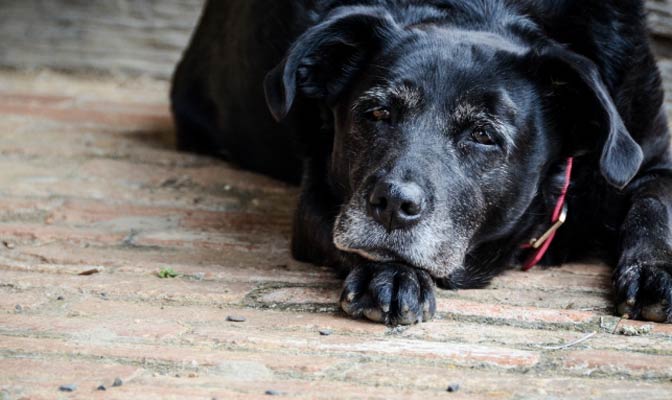Home | Aging Pet | Pet Euthanasia & Cremation
Pet Euthanasia & Cremation
Pet Euthanasia & Cremation
A decision concerning euthanasia may be one of the most difficult decisions you will ever make for your pet. Although it is a personal decision, it doesn’t need to be a solitary one. Your veterinarian, your family, and close friends can help you make the right decision and can support you as you grieve the loss of your pet. Below are questions that we often hear from pet parents that may help you navigate these difficult decisions with compassion and respect.
What should I do?
Eventually, many owners are faced with making life-or-death decisions for their pets. Such a decision may become necessary for the welfare of the pet and your family. Consider not only what is best for your pet, but also what is best for you and your family. For example, if your pet has an injury or disease that requires more care than you and your family can give to make sure it has a good quality of life, euthanasia may be the right decision. Quality of life is important for pets and people alike.
Featured Resources
We Welcome New Patients!
We're always happy to give your furry friend care at our hospital. Get in touch today!
Contact UsOnce the decision for euthanasia has been made, it is sometimes easier to discuss what you want to be done with the remains of your pet’s body before your pet is euthanized—by making arrangements prior to euthanasia; it can bring some degree of comfort to know what will be done with your pet’s body, and you will not have to focus on these decisions while you are grieving the recent loss of your beloved pet. Your veterinarian can provide information about burial, cremation, and other alternatives.
How will I know when?
If your pet can no longer experience the things it once enjoyed, cannot respond to you in its usual ways, or appears to be experiencing more pain than pleasure, you may need to consider euthanasia. Likewise, if your pet is terminally ill or critically injured, or if the financial or emotional cost of treatment is beyond your means, euthanasia may be a valid option. Sometimes asking yourself the question, “Does my pet have more bad days than good days?” can help you make the decision. Euthanasia might be necessary if a pet has become vicious, dangerous, or unmanageable. Some undesirable and abnormal behavior can be changed, so it is important to discuss these situations with your veterinarian. You and your family’s safety should always be taken into consideration.
Your veterinarian understands your bond with your pet and can examine and evaluate your pet’s condition, estimate its chances for recovery, and discuss any potential disabilities, special needs, and long-term problems. He or she can explain medical and surgical options as well as risks and possible outcomes. Because your veterinarian cannot make the euthanasia decision for you, it is important that you fully understand your pet’s condition. If there is any part of the diagnosis or the possible effects on your pet’s future that you don’t understand, ask questions that will help you understand. Although there are times when the decision needs to be made immediately, you usually will have some time to review the facts and discuss it with your family and friends before making the decision.
How do I tell my family?
Family members usually are already aware of a pet’s problems. However, you should review with them the information you have received from your veterinarian. Long-term medical care can be a burden that you and your family may be unable to bear emotionally or financially, and this should be discussed openly and honestly. Encourage family members to express their thoughts and feelings. Even if you have reached a decision, it is important that family members, especially children, have their thoughts and feelings considered.
Children have special relationships with their pets and should not be excluded from the decision-making process because they might seem too young to understand. Preventing children from participating in the process may only complicate and prolong their grief process. Children respect straightforward, truthful, and simple answers. If they are prepared adequately, children usually are able to accept a pet’s death.
Will it be painless?
Euthanasia is most often accomplished for pets by injection of a death-inducing drug. Your veterinarian may administer a tranquilizer first to relax your pet. Following injection of the euthanasia drug, your pet will immediately become deeply and irreversibly unconscious as the drug stops brain function. Death is quick and painless. Your pet may move its legs or head or breathe deeply several times after the drug is given, but these are reflexes and don’t mean that your pet is in pain or is suffering.
How can I say goodbye?
The act of saying goodbye is an important step in managing the natural and healthy feelings of grief and sorrow following the loss of a beloved friend and companion.
Once the euthanasia decision has been made, you and other family members may want to say goodbye to your pet. A last evening with your pet at home or a visit to the pet at the hospital may be appropriate. Family members who want to be alone with the pet should be allowed to do so. Some pet owners choose to be present during their pet’s euthanasia, but others choose to say goodbye beforehand and not be present during euthanasia. This is a very personal decision and you should do what feels right for you. Do not let others pressure you into making a choice that makes you uncomfortable.
How can I face the loss?
After your pet has died, it is natural and normal to feel grief and sorrow. For some people, spending some time with their pet after euthanasia is helpful. The grieving process includes accepting the reality of your loss, accepting that the loss and accompanying feelings are painful, and adjusting to your new life that no longer includes your pet. By understanding the grieving process, you will be better prepared to manage your grief and to help others in the family who share this loss.
Sometimes well-meaning family and friends may not realize how important your pet was to you or the intensity of your grief. Comments that make may seem cruel and uncaring although they were not meant to be taken that way. Be honest with yourself and others about how you feel. If you feel despair, talk to someone who will listen to your feelings about the loss of your pet. Talk about your sorrow, but also about the fun times you and your pet spent together, the activities you enjoyed, and the memories that are meaningful to you.
The stages of grief
There are many stages of grief, but not everyone experiences them all or in the same order. The stages include denial, anger, guilt, depression, acceptance, and resolution. The grief can seem to come in waves, may be brought on more intensely by a sight or sound that sparks your memory, and may seem overwhelming at times.
Your first reaction may be denial—an unwillingness to accept the fact that your pet has died or that death is unavoidable. Denial may begin when you first learn the seriousness of your pet’s illness or injuries. Often, the more sudden the death, the more difficult the loss is to accept and the stronger the denial.
Anger and guilt often follow denial. Your anger may be directed toward people you normally love and respect, including your family, friends, or your veterinarian. People coping with death will often say things that they do not really mean, unintentionally hurting those whom they do not mean to hurt. You may feel guilty or blame others for not recognizing the illness earlier, for not doing something sooner, for not being able to afford other types of or further treatment, or for being careless and allowing your pet to be injured.
Depression is a common experience after the death of a special pet. The tears flow, there are knots in your stomach, and you feel drained of all your energy. Day-to-day tasks can seem impossible to perform and you may feel isolated and alone. Many depressed people will avoid the company of friends and family. It might be hard to get out of bed in the morning, especially if your morning routine involved caring for your pet’s needs. Sometimes you may even wonder if you can go on without your pet. The answer is yes, but there are times when special assistance may be helpful in dealing with your loss. If you are suffering from profound depression, seek professional assistance.
Eventually, you will come to terms with your feelings. You can begin to accept your pet’s death. Resolution has occurred when you can remember your pet and your time with them without feeling the intense grief and emotional pain you previously felt. Acceptance and resolution do not mean that you no longer feel a sense of loss, just that you have come to terms with the fact that your pet has died.
Even when you have reached resolution and acceptance, feelings of anger, denial, guilt, and depression may reappear. If this does happen, these feelings will usually be less intense, and with time, they will be replaced with fond memories.
Although everyone experiences the stages of grief, grieving is always a very personal process. Some people take longer than others to come to terms with denial, anger, guilt, and depression, and each loss is different. If you understand that these are normal reactions, you will be better prepared to cope with your feelings and to help others face theirs. Family and friends should be reassured that sorrow and grief are normal and natural responses to death.
If you or a family member have great difficulty in accepting your pet’s death and cannot resolve feelings of grief and sorrow, you may want to discuss these feelings with a person who is trained to understand the grieving process and can support and help you as you mourn your loss. Your veterinarian certainly understands the relationship you have lost and may be able to suggest support groups and hot lines, grief counselors, clergymen, social workers, physicians, or psychologists who can help.
Remembering your pet
The period from birth to old age is much shorter for most domestic animals than for people, and death is a normal part of the lifecycle. It cannot be avoided, but understanding and compassion can help you, your family, and your friends manage the grief associated with it.
For some people, a memorial service or ritual (such as releasing balloons or spreading cremated remains) can be therapeutic. You may choose to keep and display reminders of your beloved pet. Such as photos or mementos or anything that helps you recall and treasure the good times you spent with them. You may also wish to make a memorial contribution to a charity in honor of your pet and the deep bond you shared. Just as the grieving process varies from person to person, so does the method of remembering the pet that shared your life.
Should I get another pet?
The death of a beloved pet can upset you emotionally, especially when euthanasia is involved. Some people may feel they would never want another pet. For some, the thought having—and eventually losing—another pet may seem unbearable. These feelings may pass with time. For others, a new pet may help them recover from their loss more quickly. Just as grief is a personal experience, the decision of when, if ever, to bring a new pet into your life is a personal one.
If a family member is having difficulty accepting the pet’s death, getting a new pet before that person has resolved his or her grief may make them feel that you think the life of the deceased pet was unworthy of the grief that is still being felt. Family members should agree on the appropriate time to bring a new pet into their lives. Although you can never replace the pet you lost, you can find another to share your life.
Featured Resources
We Welcome New Patients!
We're always happy to give your furry friend care at our hospital. Get in touch today!
Contact UsTips and Advice From Our Team
Looking for advice about caring for your pet? Our blog features helpful tips and educational material from our team to support your needs.



